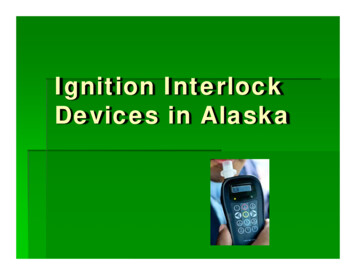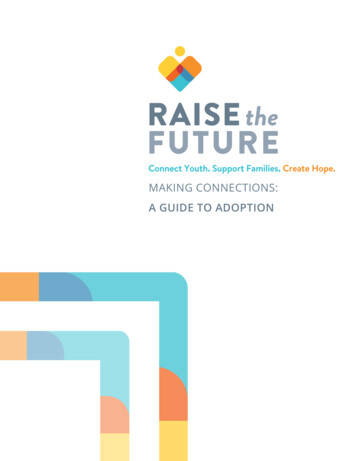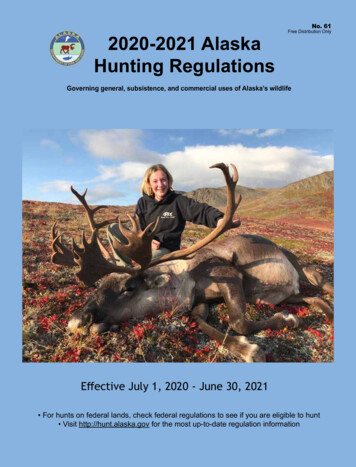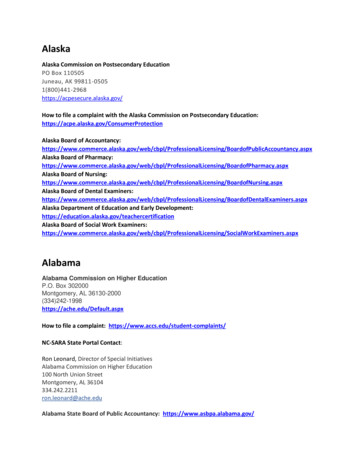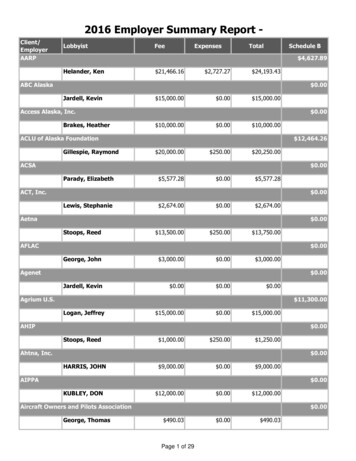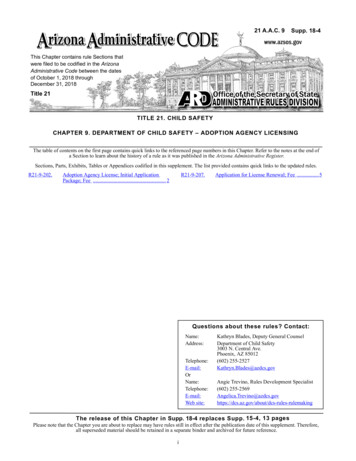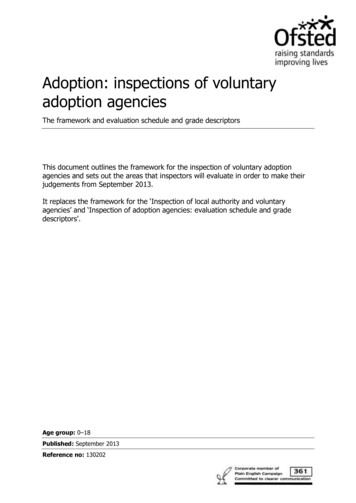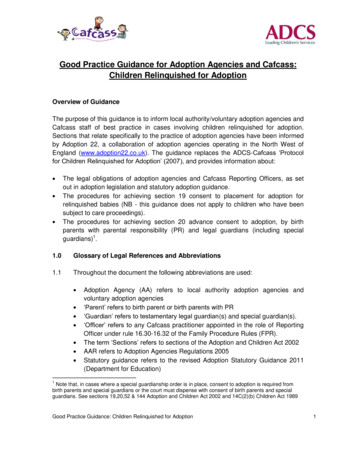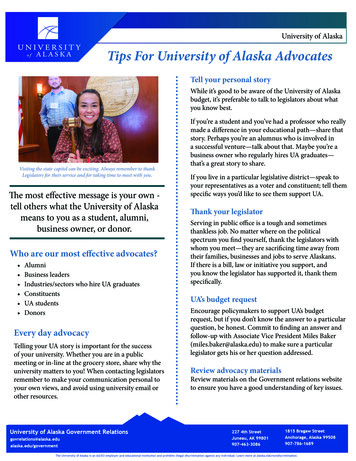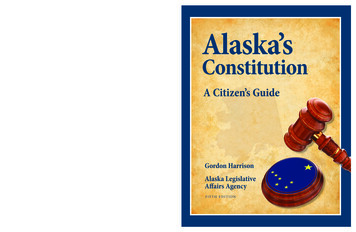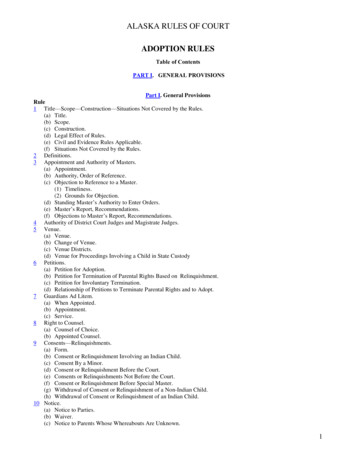
Transcription
ALASKA RULES OF COURTADOPTION RULESTable of ContentsPART I. GENERAL PROVISIONSPart I. General ProvisionsRule1 Title—Scope—Construction—Situations Not Covered by the Rules.(a) Title.(b) Scope.(c) Construction.(d) Legal Effect of Rules.(e) Civil and Evidence Rules Applicable.(f) Situations Not Covered by the Rules.2 Definitions.3 Appointment and Authority of Masters.(a) Appointment.(b) Authority, Order of Reference.(c) Objection to Reference to a Master.(1) Timeliness.(2) Grounds for Objection.(d) Standing Master’s Authority to Enter Orders.(e) Master’s Report, Recommendations.(f) Objections to Master’s Report, Recommendations.4 Authority of District Court Judges and Magistrate Judges.5 Venue.(a) Venue.(b) Change of Venue.(c) Venue Districts.(d) Venue for Proceedings Involving a Child in State Custody6 Petitions.(a) Petition for Adoption.(b) Petition for Termination of Parental Rights Based on Relinquishment.(c) Petition for Involuntary Termination.(d) Relationship of Petitions to Terminate Parental Rights and to Adopt.7 Guardians Ad Litem.(a) When Appointed.(b) Appointment.(c) Service.8 Right to Counsel.(a) Counsel of Choice.(b) Appointed Counsel.9 Consents—Relinquishments.(a) Form.(b) Consent or Relinquishment Involving an Indian Child.(c) Consent By a Minor.(d) Consent or Relinquishment Before the Court.(e) Consents or Relinquishments Not Before the Court.(f) Consent or Relinquishment Before Special Master.(g) Withdrawal of Consent or Relinquishment of a Non-Indian Child.(h) Withdrawal of Consent or Relinquishment of an Indian Child.10 Notice.(a) Notice to Parties.(b) Waiver.(c) Notice to Parents Whose Whereabouts Are Unknown.1
ALASKA COURT RULES11121314151617(d) Notice to Unknown Parent.(e) Notice to Indian Tribe.Hearings.(a) Conduct of Hearing.(b) Exclusion of Witnesses.(c) Telephonic Participation.(d) Testimony Under Oath.(e) Contested Adoptions.(f) Burden and Standard of Proof.(g ) Representation by Non-Attorney.Tribal Intervention and Removal.(a) Intervention.(b) Removal.Decree of Termination.(a) Voluntary Relinquishment.(b) Involuntary Termination of Parental Rights.Decree of Adoption.(a) Findings.(b) Additional Finding for Indian Children.Appeal.(a) Grounds, Procedure.(b) Stay.Records.(a) Report of Adoption.(b) Substitute Birth Certificate.(c) Indian Child Adoption Reports.(d) Confidential Files.(e) Adoption Index(f) Certificate of Adoption or Termination of Parental Rights.Challenges to Validity of Adoption Decree.(a) Procedure.(b) Petition under 25 U.S.C. Section 1914APPENDIXALASKA ADOPTION 23.170.25.23.173.2Construction of chapter; rights of persons affected by adoption.Who may be adopted.Who may adopt.Venue.Persons required to consent to adoption.Persons as to whom consent and notice not required.Execution of consent; consent as power of attorney.Withdrawal of consent.Petition for adoption.Report of petitioner’s expenditures.Notice of petition, investigation and hearing.Required residence of minor.Hearing.Preference of minor to be adopted; guardian ad litem; protective orders.Adult family member preference to adopt.Effect of adoption decree.Appeal and validation of adoption decree.Confidential nature of hearings and records in adoption proceedings.Recognition of foreign decree affecting adoption.Applications for birth certificates.Indian child adoption reports.
ADOPTION ngs concerning persons born outside the United States.Relinquishment and termination of parent and child relationships.Records and information.Subsidy for hard-to-place child.Investigation of home for subsidized hard-to-place child.Amount and duration of subsidy payments.Annual reevaluation of subsidy. (Repealed § 4 ch 31 SLA 2003).Regulations.Definitions.PART I. GENERAL PROVISIONSRule 1.Title—Scope—Construction—SituationsNot Covered by the Rules.(a) Title. These rules will be known and cited as theAdoption Rules.(b) Scope. These rules govern practice and procedure inthe trial courts in all phases of adoption proceedings broughtunder AS 25.23.010 through 25.23.240.(c) Construction. These rules will be construed andapplied to promote fairness, accurate fact-finding, theexpeditious determination of adoption proceedings, and thebest interests of the child.(d) Legal Effect of Rules. These rules are promulgatedpursuant to Alaska constitutional authority grantingrulemaking power to the Alaska Supreme Court. To the extentthat the rules are inconsistent with a procedural provision ofany Alaska statute not validly enacted for the specific purposeof changing a rule, these rules supersede the statute.(e) Civil and Evidence Rules Applicable. The AlaskaCivil and Evidence Rules apply to adoption proceedings exceptto the extent that any provisions of the Civil or Evidence Rulesconflict with the Adoption Rules. The provisions of Civil Rule100 apply to adoption proceedings.(f) Application of the Indian Child Welfare Act andRegulations. In all cases involving an Indian child, thestatutory provisions of 25 U.S.C. 1901 et seq., and the ICWAregulations at 25 CFR Part 23, published at 81 Fed. Reg. 38778(June 14, 2016) and effective December 12, 2016, shall apply.(g) Situations Not Covered by the Rules. Where nospecific procedure is prescribed by these rules, the court mayproceed in any lawful manner, including application ofrelevant statutes, the Alaska and United States Constitutions orcommon law. Such a procedure may not be inconsistent withthese rules and may not unduly delay or otherwise interferewith the unique character and purpose of adoptionproceedings.(SCO 972 effective January 15, 1990; amended by SCO 1469effective October 15, 2002; by SCO 1897 effective December12, 2016; and by SCO 1939 nunc pro tunc September 13,2018.)Note: Chapter 24, SLA 2018 (SB 134) concerned actions fortermination of parental rights. According to section 19(b) ofthe Act, AS AS 25.23.180(c), as amended by section 12 of theAct, and AS 25.23.180(o), enacted by section 17 of the Act,have the effect of amending Adoption Rules 1 and 6 byclarifying that a petition for involuntary termination of parentalrights may be filed in a proceeding that is independent from anadoption or a proceeding under AS 47.10 and by restructuringAS 25.23.180(c), which eliminates AS 25.23.180(c)(3).Rule 2.Definitions.(a) “Agency” means any person certified, licensed orotherwise specially empowered by law or regulation to placeminors for adoption.(b) “Child” means a son or daughter, whether by birth oradoption.(c) “Consent” means the written giving of permission toan adoption in accordance with AS 25.23.060.(d) “Extended family member” means a person asdefined by the law or custom of the Indian child’s tribe, or, inthe absence of such a law or custom, means a person who hasreached the age of eighteen and who is the Indian child’sgrandparent, aunt or uncle, brother or sister, brother-in-law orsister-in-law, niece or nephew, first or second cousin, orstepparent.(e) “Guardian ad litem” means a person appointed by thecourt to represent the best interests of the child in an adoptionproceeding.(f) “Indian” means any person who is a member of anIndian tribe, or who is an Alaska Native and a member of aregional corporation as defined in 43 U.S.C. Section 1606.(g) “Indian child” means any unmarried person who isunder the age of 18 and who is either (a) a member of anIndian tribe, or (b) is eligible for membership in an Indian tribeand is the biological child of a member of an Indian tribe.(h) “Indian child’s tribe” means (a) the Indian tribe inwhich an Indian child is a member or eligible for membership,or (b), in the case of an Indian child who is a member of oreligible for membership in more than one tribe, the Indian tribewith which the Indian child has the more significant contacts.(i) “Indian custodian” means any Indian person who haslegal custody of an Indian child under tribal law or custom orunder state law, or to whom temporary physical care, custodyand control has been transferred by the parent of the child.3AdptR
ALASKA COURT RULES(j) “Indian tribe” means any Indian tribe, band, nation orother organized group or community of Indians recognized aseligible for services provided to Indians by the Secretary of theDepartment of the Interior because of their status as Indians,including an Alaska Native village as defined in 43 U.S.C.Section 1602(c).(k) “Judge” means a superior court judge, a standingmaster, or a district court judge or magistrate judge appointedas a special master pursuant to Adoption Rule 3.(l) “Minor” means a person who has not reached the ageof majority.(m) “Parent” means a biological or adoptive parent.(n) “Parties” means the petitioners, person to be adopted,the parents of the person to be adopted, anyone who has a rightto consent under AS 25.23.040, a guardian ad litem, and anyperson or entity who has intervened.(o) “Relinquishment” means a written surrender ofparental rights in compliance with AS 25.23.180.(2) Grounds for Objection. An objection to theassignment of a master must set forth sufficient grounds fromwhich the court may determine whether good cause exists toremove the matter from the master’s jurisdiction. Good causemay include involvement of:(i) complex questions of law which require a decision bya superior court judge; or(ii) questions requiring prompt resolution which wouldbe seriously impaired by reference to a master.(d) Standing Master’s Authority to Enter Orders. Astanding master is authorized to take the following actionswithout further approval by a superior court judge:(1) appoint counsel and guardians ad litem;(2) order home studies;(3) set hearings and order continuances of the hearings;(4) accept and approve stipulations; andAdptR(SCO 972 effective January 15, 1990; amended by SCO 1084effective January 15, 1992; and by SCO 1829 effectiveOctober 15, 2014)Cross References(f) CROSS REFERENCE: 25 U.S.C. § 1903(3).(g) CROSS REFERENCE: 25 U.S.C. § 1903(4).(h) CROSS REFERENCE: 25 U.S.C. § 1903(5).Rule 3.Appointment and Authority of Masters.(a) Appointment. The presiding judge may appoint astanding master to conduct adoption proceedings.Appointments of standing masters must be reviewed annually.The presiding judge may appoint a special master to conduct aproceeding which is specified in the order of reference.(b) Authority, Order of Reference.(1) An order of reference specifying the extent of themaster’s authority and the type of appointment must be enteredin every case assigned to a master. The order of reference mustbe served on all parties.(2) A master’s report is not binding until approved by asuperior court judge pursuant to Civil Rule 53(d) andparagraph (f) of this rule, except that a master may enter orderswithout further approval of the superior court pursuant to CivilRule 53(b) and (c), and paragraph (d) of this rule.(5) accept voluntary relinquishments of parental rightsand consents to adoption, and, in the case of an Indian child,make the requisite judicial certification of voluntary consentrequired by federal law.(e) Master’s Report, Recommendations. A master mayissue a written report or oral findings on the record concerningan order or recommendation which must be approved by asuperior court judge. The master shall advise the parties on therecord of their right to file objections to any such decisionspursuant to paragraph (f) of this rule.(f) Objections to Master’s Report, Recommendations. Objections to Master’s Report, Recommendations.Objections to a master’s report or recommendation must befiled within ten days of service of the report unless the courtrequires objections to be filed earlier. In the case of arecommendation rendered orally on the record where a partyrequests an electronic recording of the recommendation, thetime period for objection runs from receipt of the recording. Areply to the objections must be filed within three days ofservice of the objections. The superior court may permit oralargument, order the taking of further evidence, or grant ahearing de novo.(SCO 972 effective January 15, 1990; and amended by SCO1555 effective October 15, 2004)Rule 4.Authority of District Court Judges andMagistrate Judges.(c) Objection to Reference to a Master. In addition tothe peremptory challenge of a master provided for in CivilRule 42(c), a party may file an objection to a referral to amaster in the following manner:A district court judge or magistrate judge may not presideover adoption proceedings in the absence of appointment as amaster pursuant to Adoption Rule 3 or, in the case of a districtcourt judge, appointment by the chief justice as a superiorcourt judge pro tempore.(1) Timeliness. A party may file an objection no laterthan five days after receiving notice of an order of reference.(SCO 972 effective January 15, 1990; and amended by SCO1829 effective October 15, 2014)4
ADOPTION RULESRule 5.Venue.(a) Venue. Except as provided in subsection (d),adoption proceedings must be brought in superior court in thejudicial district or venue district in which, at the time of filingthe petition, the petitioner or the person to be adopted residesor is in military service, or in which the agency having thecare, custody, or control of the person to be adopted is located.(b) Change of Venue. Venue may be changed in theinterest of substantial justice pursuant to AS 22.10.040 after apetition is filed.(c) Venue Districts. Venue districts as used in this rulerefer to the districts referenced in the Venue District Mapattached to Criminal Rule 18.(d) Venue for Proceedings Involving a Child in StateCustody. A petition to adopt a child in state custody under AS47.10 must be brought in the superior court where the child-inneed-of-aid proceeding is pending or in the judicial district inwhich the petitioner resides as provided under AS 47.10.111and AS 25.23.030(d).(SCO 972 effective January 15, 1990; amended by SCO 1886effective January 1, 2017; and by SCO 1898 effective January1, 2017)Note: Chapter 6, 4SSLA 2016 (HB 200) enacted changes tothe procedures for adopting or becoming the guardian of achild in state custody. Section 14 of the Act amended AdoptionRule 5, effective January 1, 2017, by adding a new subsectionaddressing where to file an adoption petition when the child isin state custody. This rule change is adopted for the sole reasonthat the legislature has mandated the amendment.Rule 6.Petitions.(a) Petition for Adoption.adopt a child in state custody under AS 47.10 shall be heardeither(A) as part of the child-in-need-of-aid proceeding; or(B) in the judicial district in which the petitioner residesif the petitioner provides notice to all of the parties to the childin-need-of-aid proceedings and no party objects.(b) Petition for Termination of Parental Rights Basedon Relinquishment. A petition for termination based on thevoluntary relinquishment of parental rights pursuant to AS25.23.180(b) must state, in addition to the information requiredby paragraph (a), that the parent has or intends to relinquishparental rights to the child.(c) Petition for Involuntary Termination. A petition fortermination based on the involuntary termination of parentalrights pursuant to AS 25.23.180(c)(1)(A), (1)(B), or (2) muststate, in addition to the information required by paragraph (a),the specific statutory and factual basis of the claim thatparental rights should be involuntarily terminated.(d) Relationship of Petitions to Terminate ParentalRights and to Adopt.(1) A petition to terminate parental rights under paragraph(b) or (c) of this rule may be combined with a petition foradoption.(2) In a petition for termination of parental rights underparagraph (b) or (c) of this rule filed before a petition foradoption, the term “petitioner” in AS 25.23.080(b)(4)–(6) willbe interpreted to mean the person who will have custody of thechild pending adoption.(SCO 972 effective January 15, 1990; amended by SCO 1568effective October 15, 2005; by SCO 1650 effective October15, 2007; by SCO 1886 effective January 1, 2017; by SCO1939 nunc pro tunc September 13, 2018; and by SCO 1979effective February 2, 2022)(1) An adoption petition must include the informationrequired by AS 25.23.080 except as provided under (a)(4) ofthis rule. A separate petition must be filed for each person tobe adopted. If the proceeding involves a minor, the petitionmust also state whether the minor to be adopted is an Indianchild and whether any other court cases involving the minorare known to be pending.Note: Chapter 6, 4SSLA 2016 (HB 200) enacted changes tothe procedures for adopting or becoming the guardian of achild in state custody. Sections 15 and 16 of the Act amendedAdoption Rule 6(a), effective January 1, 2017, to incorporateand reference the new requirements for proceedings to adopt achild in state custody. This rule change is adopted for the solereason that the legislature has mandated the amendment.(2) An adoption petition involving an Indian child mustinclude a statement of petitioner’s compliance with theplacement preferences provided by 25 U.S.C. Section 1915(a).The petition must state the identity of the child’s tribe, ifknown; whether the child is reasonably believed to be aresident or domiciliary of an Indian reservation as defined in25 U.S.C. Section 1903(10); and whether the child is known tobe a ward of a tribal court.Note: Chapter 24, SLA 2018 (SB 134) concerned actions fortermination of parental rights. According to section 19(b) ofthe Act, AS AS 25.23.180(c), as amended by section 12 of theAct, and AS 25.23.180(o), enacted by section 17 of the Act,have the effect of amending Adoption Rules 1 and 6 byclarifying that a petition for involuntary termination of parentalrights may be filed in a proceeding that is independent from anadoption or a proceeding under AS 47.10 and by restructuringAS 25.23.180(c), which eliminates AS 25.23.180(c)(3).(3) The report of expenditures required by AS 25.23.090may be incorporated into the petition.Rule 7.Guardians Ad Litem.(4) A proceeding to adopt a child in state custody underAS 47.10 must comply with AS 47.10.111. A proceeding to5AdptR
ALASKA COURT RULES(a) When Appointed. The court may appoint a guardianad litem for a child in an adoption proceeding when necessaryto promote the child’s best interests.(b) Appointment. Guardians ad litem will be appointedin accordance with the provisions of AS 25.23.100 andAdministrative Rule 12. The court shall specify the duties ofthe guardian ad litem and the duration of the appointment in itsorder of appointment.(c) Service. A guardian ad litem is a party and must beserved with pleadings and notices according to the civil rules.(SCO 972 effective January 15, 1990; amended by SCO 1092effective July 15, 1992)Rule 8.(a) Form. A consent or relinquishment must be inwriting and must include:(1) notice of the person’s right to withdraw the consentor relinquishment as provided by paragraphs (g) and (h) of thisrule;(2) the address and telephone number of the court inwhich the adoption or relinquishment proceeding has or isexpected to be filed;(3) a statement of the right to counsel as stated in Rule 8;(4) a statement concerning whether or not any visitationrights or other parental privileges are sought to be retainedafter the adoption;Right to Counsel.(a) Counsel of Choice. The court shall ensure at the firstappearance of a parent that the parent is informed of the rightto counsel of their choice at the parent’s own expense. Thecourt shall ensure that a child is advised of the right to counselat the time the child appears to sign a consent to adoption.AdptR(b) Appointed Counsel.(1) The court shall appoint counsel at public expensepursuant to Administrative Rule 12(e)(1)(A)(i) to represent anindigent parent of an Indian child.(2) The court shall appoint the Office of PublicAdvocacy to represent an indigent parent against whom aninvoluntary termination of parental rights is sought pursuant toAS 25.23.180(c)(2).(5) if a consent, the information required in AS25.23.060; and(6) if signed by a parent, a statement of whether theparent is a minor.(b) Consent or Relinquishment Involving an IndianChild. A consent or relinquishment involving an Indian childmust be signed in a hearing in the presence of a judge unlessthe consent is by an agency. In addition to the explanationsrequired by paragraph (d), the court shall inquire as to whatefforts have been made to comply with the placementpreferences of 25 U.S.C. Section 1915(a). Consent foradoption or relinquishment of parental rights of an Indian childmay not be given prior to or within ten days following the birthof the child.(c) Consent By a Minor.(3) The court shall also appoint counsel at publicexpense pursuant to Administrative Rule 12 to represent:(A) an indigent parent against whom an involuntarytermination of parental rights is sought on grounds other thanstated in AS 25.23.180(c)(2), if the action is brought by thestate or by a party represented by the Alaska Legal ServicesCorporation or the Alaska Pro Bono Program; and(B) an indigent parent who is defending against a claimthat the parent’s consent to adoption is not required under AS25.23.050(a).(4) The court may appoint counsel under AS 25.24.310to represent a minor child who is to be adopted.(SCO 972 effective January 15, 1990; amended by SCO 1092effective July 15, 1992; and by SCO 1169 effective July 15,1994; by SCO 1187 effective July 15, 1995; by SCO 1296effective January 15, 1998; and by SCO 1979 effectiveFebruary 2, 2022)*An indigent Indian custodian has a right to court-appointedcounsel under 25 U.S.C. § 1912(b). Counsel appointed under§ 1912 must seek compensation pursuant to 25 CFR 23.13.Rule 9.6Consents—Relinquishments.(1) A consent by a minor child over the age of 10 to thechild’s adoption must be signed in writing and must be in thepresence of the court unless the court in the best interest of theminor dispenses with the minor’s consent or the requirementthat the child consent in court.(2) A consent by a parent who is a minor to an adoptionof the parent’s child must be signed in the presence of thecourt.(d) Consent or Relinquishment Before the Court. If aconsent or relinquishment is to be signed in the presence of thecourt, the judge shall first determine that the terms andconsequences of the document were explained in detail to theperson in a language that the person understands. The courtalso must determine that the person understands these termsand consequences, and that the person voluntarily signs theconsent or relinquishment. If the identity or whereabouts of theother parent is in question, the court shall inquire into thesematters.(e) Consents or Relinquishments Not Before theCourt. A consent or relinquishment to an adoption not taken inthe presence of a judge must comply with AS 25.23.060. Arelinquishment not taken in the presence of a judge mustcomply with AS 25.23.180(b).
ADOPTION RULES(f) Consent or Relinquishment Before SpecialMaster. A consent or relinquishment required to be taken inthe presence of a judge must be taken in the physical presenceof a judge. However, in exceptional circumstances the judgeassigned to hear the entire proceeding may request that thepresiding judge appoint a peace officer or person authorized toadminister oaths or affirmations as a special master underAdoption Rule 3 for the limited purpose of sitting as the judgein whose physical presence the person gives the consent orrelinquishment. The judge assigned to hear the entireproceeding must be telephonically present when the consent orrelinquishment is taken. Both the special master and the judgeassigned to hear the entire proceeding must make oral orwritten findings concerning the identity of the person signingthe consent or relinquishment, whether the person understoodthe consent or relinquishment, and whether the person signedvoluntarily. The requirements of paragraph (c) also must bemet.(g) Withdrawal of Consent or Relinquishment of aNon-Indian Child. The parent of a non-Indian child maywithdraw a consent or relinquishment by notifying in writingthe court, or the person or agency obtaining the consent orrelinquishment, within 10 days of the birth or signing of theconsent or relinquishment, whichever is later. Notification istimely if received or postmarked on or before the last day ofthis time period. The parent may move the court to permitwithdrawal of the consent or relinquishment after the 10 dayperiod pursuant to AS 25.23.070 for a consent or AS25.23.180(g) or AS 47.10.089(h) for a relinquishment.(h) Withdrawal of Consent or Relinquishment of anIndian Child. The parent of an Indian child may withdraw aconsent or relinquishment by notifying in writing the court orthe person or agency obtaining the consent or relinquishmentat any time before the signing of the decree of adoption for aconsent or the order of termination for a relinquishment.Notification is timely if received or postmarked on or beforethe last day of this time period. A decree of adoption or orderof termination may not be signed until 10 days have passedsince the signing of the consent or relinquishment.(SCO 972 effective January 15, 1990; amended by SCO 1276effective July 15, 1997; and by SCO 1580 effective nunc protunc to July 1, 2005)NOTE: Chapter 64, sections 56 and 57, SLA 2005 (HB 53)amended Adoption Rule 9 as reflected in section 9 of thisOrder. The change to Adoption Rule 9 is adopted for the solereason that the legislature has mandated the amendment. Inaddition, according to section 60(b) of the Act, AS25.23.180(j) - (n) and AS 47.10.089, enacted in sections 4 and17, amend Adoption Rule 9 by requiring retained privileges tobe set out in the relinquishment form and order and byproviding additional procedures related to the relinquishment.Rule 10.Notice.(a) Notice to Parties. Petitioner shall give notice of theadoption hearing to the persons required by AS 25.23.100(a).The notice must contain the information required by AS25.23.100(b) and must be served in the manner provided bythis rule and Civil Rule 4, except that in an adoption involvingan Indian child, notice must be by personal service or certifiedor registered mail with proof of service dated no later than 10days before the adoption hearing. Notice of the adoptionhearing must also be given to extended family members of anIndian child who have intervened in the adoption proceedingor participated as a party in any prior child custody proceedinginvolving the child.(b) Waiver. A party may waive the party’s right tonotice by filing a written notarized waiver with the court.(c) Notice to Parents Whose Whereabouts AreUnknown. If the name of a parent who has not consented tothe adoption is known, but the person’s whereabouts cannot beascertained after diligent inquiry, the petitioner may move thecourt to allow notice under Civil Rule 4(e). Any notice postedor published under Civil Rule 4(e) must give the full name, ifknown, of the person to whom the notice is directed. All otherparties must be identified by initials rather than names. In anadoption involving an Indian child, additional notice to theparent must be sent in care of the Secretary of the Interior.(d) Notice to Unknown Parent. If the identity of theparent is unknown and the court is satisfied that no form ofnotice, even under Civil Rule 4(e), is reasonably likely to giveactual notice to the parent, the court may waive notice.(e) Notice to Indian Tribe. In an adoption orrelinquishment proceeding involving an Indian child, noticemust be given to the child’s tribe at the time of the petition or,if the child’s tribe is not known at this time, reasonablypromptly after the tribe has been determined. However, noticeis not required if parental rights are to be voluntarilyterminated and the parent files a statement that the tribe has notbeen served with notice in order to protect the privacy of theparent. The notice, if required, must be by personal service orcertified or registered mail, with proof of service dated no laterthan 10 days before the adoption hearing and, if applicable,also 10 days before the entry of the decree of termination. Thenotice, if required, must be sent with a copy of the petition andmust contain:(1) a statement that the Indian child’s tribe has a right tointervene in the proceeding;(2) a statement of the right of the tribe to request twentyadditional days to prepare for the proceedings;(3) the mailing address and telephone number of thecourt;(4) a statement that the tribe may have a right to petitionthe court to transfer the proceedings to a tribal court authorizedto exercise jurisdiction under federal law; and(5) a statement that since adoption proceedings areusually conducted on a confidential basis, tribal officials shallkeep the information contained in the notice confidential.(SCO 972 effective January 15, 1990; amended by SCO 1879effective October 15, 2016)7AdptR
ALASKA COURT RULESRule 11. Hearings.(a) Conduct of Hearing. Adoption hearings areconfidential proceedings tried by the court without a jury andmust be conducted pursuant to AS 25.23.150(a).(b) Exclusion of Witnesses. Witnesses may be excludedfrom a hearing pursuant to Evidence Rule 615.(c) Telephonic Participation. The court may conductany hearing with telephonic participation as provided by CivilRule 99, except as provided by Adoption Rule 9(f). Payment oftelephone costs is governed by Administrative Rule 48.(d) Testimony Under Oath. All testimony must begiven under oath or affirmation as required by Evidence Rule603.(e) Contested Adoptions. The court may issue a pretrialorder when the parties contest any issue. The court shallconsider the advisability of appointing a guardian ad litem incontested adoptions.AdptR(f) Burden and Standard of Proof. The
25.23.130. Effect of adoption decree. 25.23.140. Appeal and validation of adoption decree. 25.23.150. Confidential nature of hearings and records in adoption proceedings. 25.23.160. Recognition of foreign decree affecting adoption. 25.23.170. Applications for birth certificates. 25.23.173. Indian child adoption reports.
